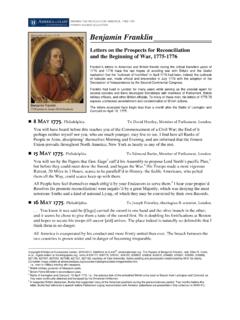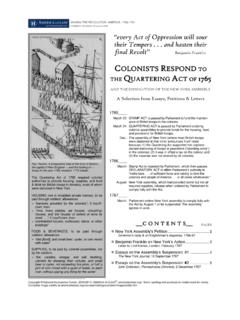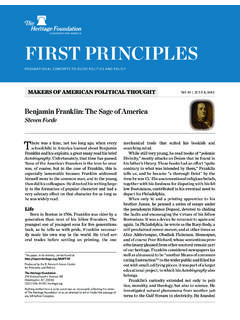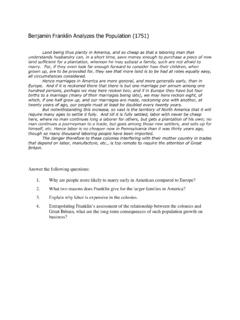Transcription of How Benjamin Franklin Became the “Father of By
1 ON MY MIND How Benjamin Franklin Became the father of American Insurance By M ichael D. White is Managing Director of Financial Institutions Insurance Association and President of Michael White Associates, Bank Insurance Consultants, Radnor, PA. I n the spring of 1730, a major fire broke out in Fishbourne's wharf in Philadelphia, destroying stores and homes and threatening to consume the entire city. Till then, the city owned only one old engine (a cart with a hand-pump, water barrel and hose), a few leather buckets and wooden lad-ders.
2 Panicked by this fiery disaster and generally unprepared to fight the ever-present danger of fires, Philadel-phia purchased three additional en-gines, 20 ladders, 25 iron hooks (attached to long wooden poles and used to pull down burning walls), and 400 buckets and stationed this equip-ment at various strategic spots around the city. Still, the great danger of a massive, citywide conflagration per-sisted, since there was no organized fire-fighting force and the equipment was extremely primitive.
3 On February 4, 1735, following another fire, a most interesting letter on the subject of preventing and extin-guishing fires appeared in The Phila-delphia Gazette, a newspaper that had the largest circulation in colonial America. The letter, presumed to be written by an old citizen who had con-siderable experience with and knowl-edge of fires, contained well-reasoned advise, offered numerous reforms and told of the formation in a "city in a neighboring province" of a "society of active men belonging to each fire en-gine, whose business is to attend all fires whenever they may happen.
4 Be-sides becoming proficient from prac-tice, these men hold quarterly meetings to talk over how they can improve their methods. Since the establishment of the Society," observed the letter writer, "there has been no extraordi-nary fire in that place." Additionally, the author admon-ished Philadelphians to carry burning coals from one room to another "in a warming pan and shut," and he pro-posed prohibiting "too shallow hearths" and wooden moldings on each side of the fireplace.
5 He advised that chimneys be cleaned more carefully and frequently and that chimney sweeps be licensed and held liable and fined for any chimney fire that oc-curred within 15 days of a chimney cleaning. In the spirit of his sugges-tions, the letter-writer remarked: "An ounce of prevention is worth a pound of cure." The city's first fire-fighting group The letter aroused Philadelphians to form the city's first fire-fighting or-ganization. It's author?
6 Benjamin Franklin , of course, then the 29-year old publisher of the Gazette, who was soon to create America's first organ-ized fire brigades and found the incipi-ent nation's first fire insurance com-pany, The Philadelphia Contribution-ship for the Insurance of Houses from Loss by Fire. Franklin and four others soon founded Union Fire Company, the pio-neer fire-fighting brigade. This volun-tary association quickly grew to its For Franklin , insurance was an idea whereby every man might help another without any disservice to himself.
7 1 Bank Insurance Marketing / Winter 1998 ON MY MIND prescribed membership limit of 30 men. Each man purchased buckets, hooks and other equipment to take to a fire. Any man who failed to answer the fire-call or was negligent in main-taining his fire-fighting equipment was fined. The members met once a month for "a social evening together, in dis-cussing and communicating such ideas as occurred to us on the subject of fires" according to Franklin . Many more wanted to join the Union Fire brigade, and "they were advised to form ; and this went on, one new company being formed after an-other, till they Became so numerous as to include most of the inhabitants who were men of property" ( Franklin ).
8 Soon "half a dozen volunteer fire com-panies were earnestly functioning in the city. As a result of their collective zeal, Philadelphia Became , so far as fires were concerned, the safest city in America" (John Bainbridge, Biography of An Idea: The Story of Mutual Fire and Casualty Insurance). Never satisfied, Franklin continued to urge fire prevention methods. He opposed the boiling of oil indoors. He noted that the use of axes to open holes in a building near Christ Church had enabled the water from engines and buckets to enter the building more readily and do "ten times the service it could otherwise have done.
9 " The Franklin Stove Four years after organizing the fire company, Franklin invented a new kind of stove that was safer and more efficient in saving fuel than any then available. He called it the Pennsylva-nian Fire-Place, but it soon came to be known as the Franklin Stove. Many assume this stove was built to make a better fire, but Franklin actually de-signed it to prevent a bigger fire. It contained the fire's flames so that hot embers did not shoot out onto the floor and start fires, as often happened with fireplaces.
10 Franklin 's intention in in-venting the lightning rod was also to prevent fires by protecting "habitations and other buildings from mischief by thunder and lightning." Still, despite his continuing education in preventing fires and ongoing improvements in extinguishing them, Franklin realized that the occurrence of all fires could not be prevented. People would still suffer property damage and loss from fire. Franklin broached the idea of form-ing an insurance company at a meeting of the Union Fire Company on Febru-ary 26, 1750.









